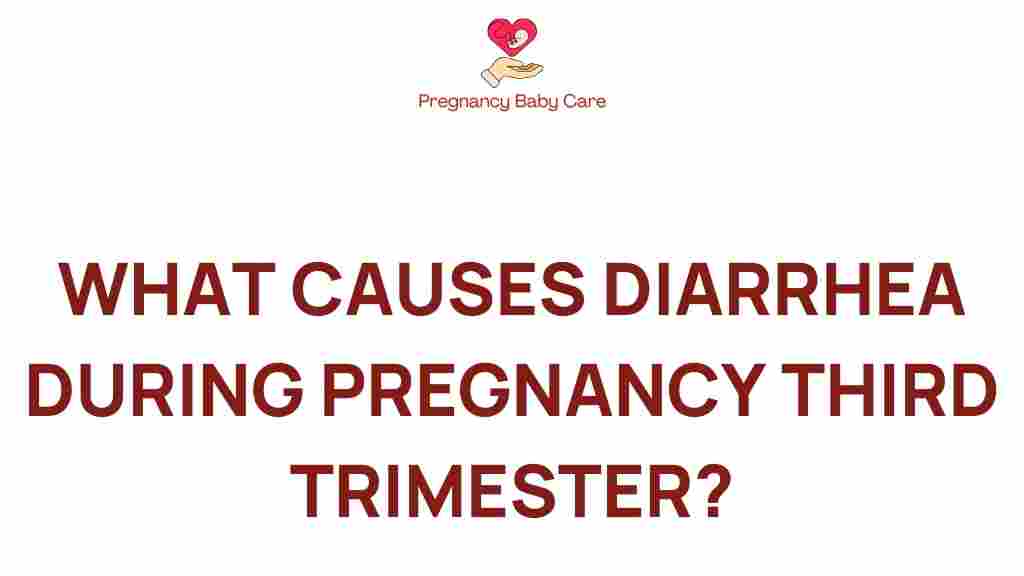Unraveling the Mystery: What Causes Diarrhea During Pregnancy’s Third Trimester?
Pregnancy is a miraculous journey filled with excitement, anticipation, and a myriad of changes in a woman’s body. As the third trimester approaches, many expectant mothers experience various symptoms, including digestive disturbances. One common issue that arises during this stage is diarrhea. Understanding the causes, symptoms, and management of diarrhea during pregnancy’s third trimester is crucial for maintaining good maternal health and ensuring the well-being of both mother and baby.
Understanding Diarrhea in Pregnancy
Diarrhea is characterized by frequent, loose, or watery stools. While it can be unsettling, especially during pregnancy, it’s essential to recognize that it can stem from various factors. In the third trimester, the body undergoes significant hormonal and physical changes that can affect digestive health.
Common Symptoms of Diarrhea
Before diving into the causes, it’s important to identify the symptoms associated with diarrhea:
- Increased frequency of bowel movements
- Loose or watery stools
- Abdominal cramps or pain
- Nausea or vomiting
- Dehydration symptoms (dry mouth, dizziness, reduced urine output)
If you experience severe symptoms, it is essential to consult with your healthcare provider.
Causes of Diarrhea During Pregnancy’s Third Trimester
Several factors can contribute to diarrhea during this critical phase of pregnancy. Here are some common causes:
1. Hormonal Changes
During pregnancy, hormonal fluctuations, especially increased levels of progesterone, can affect the digestive system. This hormone relaxes the muscles of the intestines, sometimes leading to changes in bowel movements.
2. Dietary Changes
As nutritional needs evolve during pregnancy, many women alter their diets. Introducing new foods or consuming higher amounts of fiber can lead to digestive upset and diarrhea. Common dietary changes include:
- Increased fiber intake from fruits and vegetables
- Consumption of dairy products, especially if lactose intolerance is present
- Eating spicy or fatty foods
3. Prenatal Vitamins
While prenatal vitamins are essential for maternal and fetal health, some formulations can cause gastrointestinal issues, including diarrhea. If you suspect your vitamins are the culprit, consult your healthcare provider about alternatives.
4. Foodborne Illness
Pregnant women are more susceptible to foodborne illnesses due to a weakened immune system. Contaminated food can cause diarrhea and other gastrointestinal symptoms. It’s crucial to practice safe food handling and consumption:
- Avoid raw or undercooked meats and seafood
- Wash fruits and vegetables thoroughly
- Refrain from unpasteurized dairy products
5. Infections
Gastrointestinal infections can lead to diarrhea. These can be viral, bacterial, or parasitic in nature. If accompanied by fever, severe abdominal pain, or dehydration, seek medical attention promptly.
6. Stress and Anxiety
The emotional ups and downs of pregnancy can also manifest physically. Stress and anxiety can disrupt digestive health and lead to diarrhea. Techniques such as yoga, meditation, or prenatal counseling can help manage these feelings.
Managing Diarrhea in the Third Trimester
While experiencing diarrhea during pregnancy can be concerning, several steps can be taken to manage symptoms and promote digestive health:
1. Stay Hydrated
Dehydration can pose risks for both mother and baby. Ensure you drink plenty of fluids, such as:
- Water
- Electrolyte solutions
- Clear broths
2. Modify Your Diet
Consider the following dietary adjustments if you’re experiencing diarrhea:
- Adopt a bland diet (BRAT diet: bananas, rice, applesauce, toast)
- Avoid dairy, caffeine, and high-fat foods temporarily
- Incorporate easily digestible foods, such as boiled potatoes and plain crackers
3. Monitor Symptoms
Keep a journal of your symptoms, dietary intake, and any medications you are taking. This information can be valuable for your healthcare provider in diagnosing and managing your condition.
4. Consult Your Doctor
If diarrhea persists for more than a couple of days or is accompanied by severe symptoms, it is crucial to consult your healthcare provider. They may recommend:
- Adjustments to prenatal vitamins
- Probiotics to restore gut health
- Medications that are safe during pregnancy
When to Seek Medical Attention
While mild diarrhea may not require urgent care, specific signs should prompt you to seek help immediately:
- Severe abdominal pain
- High fever (above 101°F or 38.3°C)
- Signs of dehydration (dizziness, fainting, decreased urine output)
- Diarrhea lasting more than 48 hours
- Blood in stools
Conclusion
Experiencing diarrhea during pregnancy’s third trimester can be concerning, but understanding its causes and symptoms is vital for managing your health. By focusing on good nutrition, staying hydrated, and seeking prenatal care, you can navigate this stage of pregnancy more comfortably.
Always remember that your healthcare provider is your best resource for addressing any health concerns during pregnancy. If you have further questions about maternal health or digestive health during this critical time, don’t hesitate to reach out.
For more information about maintaining a healthy pregnancy, check out this resource.
This article is in the category Pregnancy and created by PregnancyBabyCare Team
